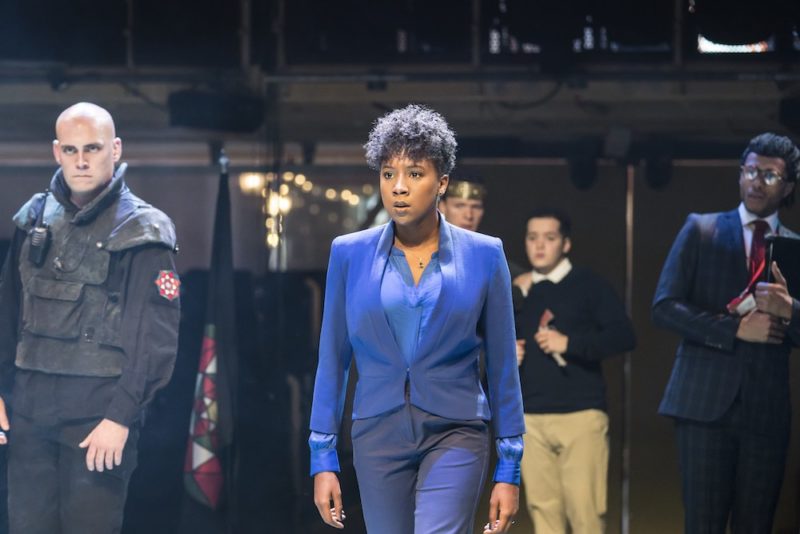Shakespeare is not everyone’s cup of tea. The Bard dominates the stage, but equally divides theatre audiences, who are either happy to see lengthy RSC styled productions that deal with murder and betrayal or those that think the great playwright is no longer relevant in 2018. And yet theatre houses and production companies cannot get enough of Shakespeare, with it dominating the landscape in not only the West End but also here in Manchester. So you could be forgiven in thinking that Queen Margaret, a reworking if you like of some of the Bard’s historical plays, that it would be another of his productions where it delights his devotees and dismays his detractors. However, The Royal Exchange might just have managed to wow both sets of fans!
Queen Margaret may not be a Shakespeare play that you have ever heard of before, that is because technically it’s not really a play by Shakespeare at all. Jeanie O’Hare has written a new play that tells the story of the War of the Roses by drawing heavily on the Bard’s plays about Henry VI and Richard III. The notable difference is that O’Hare has decided to see the story in a new light, from the point of view of Margaret of Anjou, the embattled wife of King Henry VI.
Reworkings are not unfamiliar when it comes to the texts and plays written by old Will. Nor is the current trend to focus on Shakespeare’s female characters. The current production of OthelloMacbeth is an example of how modern theatre now wants to reimagine these plays, bringing Shakespeare’s most iconic female characters to the fore. This is not a surprise given that most of the female characters in his plays are relegated to a mere sideshow. The Royal Exchange has previously redressed this balance by producing a version of Hamlet where Maxine Peake play the lead. Therefore, it is hardly surprising that the Exchange should once again be at the forefront in championing a production that puts the spotlight on the female protagonist for once.
In this case, Queen Margaret, is no fad. Shakespeare wrote a hefty chunk for the historical role of Margaret, with it being the only character that appears alive and well in all four of his plays that deal with Henry VI and Richard III. Indeed, Margaret of Anjou has more lines than any other female Shakespearean role (even more than King Lear). However, ask any Shakespearean fanatic to list the Bard’s most memorable female characters and you’d be hard pressed to find Margaret mentioned at all.
It seems odd to me that Margaret is resigned to such a literary fate. After all historically she was considered by many to be the power behind the throne of Henry VI. It was she that influenced the dynastic civil strife and instigated the War of the Roses. Her scheming and endless lust for power makes that other great literary Shakespearean character, Lady Macbeth, look like an amateur Machiavellian in comparison. What’s more O’Hare realised the importance of Margaret to Shakespeare’s historical plays, and crafted a whole new production based around her as the central character.
O’Hare’s subtle script has been more than matched elsewhere in this production. The vibe always skirts that fine line between modernity and tradition. The costumes are recognisable as if you’d be walking down Market St, the set is minimilatic allowing the players to dominate proceedings, the direction from Elizabeth Freestone is refreshingly direct, never allowing scenes to labour under the glare of the paying galleries and all the while O’Hare’s script sizzles with tension.
The “diverse” cast are more than happy to rise to the occasion with some notable performances. This cast is notable for its gender swapping and its diversity and much can be made out of this for both good and bad. Nonetheless, for me the strength of this play was borne out of some fantastic portrayals of Shakespeare’s characters and their gender or ethnicity was of little importance.
Lucy Mangan is eerily chilling as the ghostly Joan of Arc whilst Roger Morlidge festers fantastically as Gloucester. The trinity of Lorraine Bruce, Helena Lymbery and Jade Anouka is what really sets this play apart from its current contemporaries. Bruce is frighteningly scintillating as the rageful York, whilst Lymbery commands the stage as the embattled Hume. Anouka, however, is the jewel in the show’s crown, giving a barn storming performance as the titular Queen Margaret. Her performance bristles with bravado, from her brash entrance to her slow descent into the demonic power crazed Margaret.
Queen Margaret is one of those rare productions. It draws on the past but gives the old story a new fresh perspective, allowing the audience, those that love the Bard and those that probably do not, to revel in its majesty.
Verdict: A stunning reworking of Shakespeare’s plays Henry VI and Richard III, telling the dynastic civil War of the Roses from the perspective of Queen Margaret. Jade Anouka is superb as the Queen in a production that should leave both traditionalists and new fans utterly enthralled.[usr 4 text=”false”]
